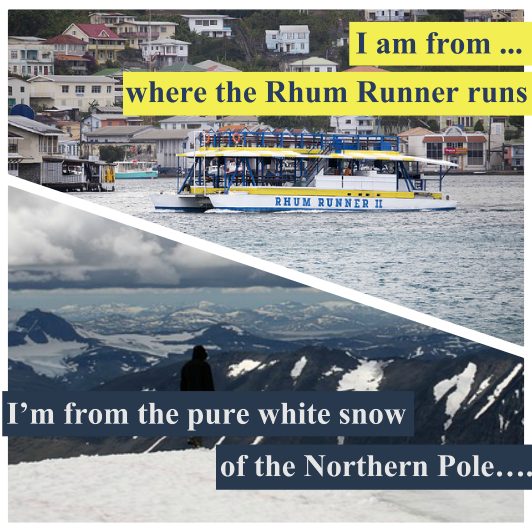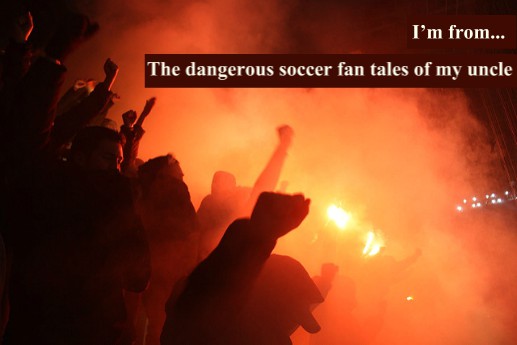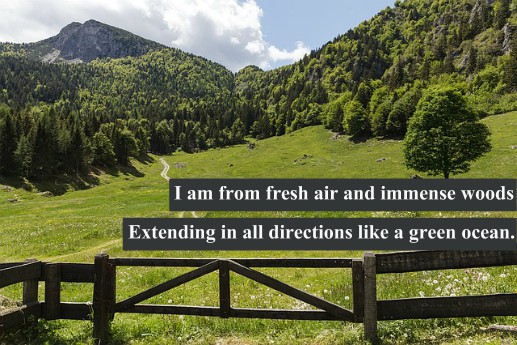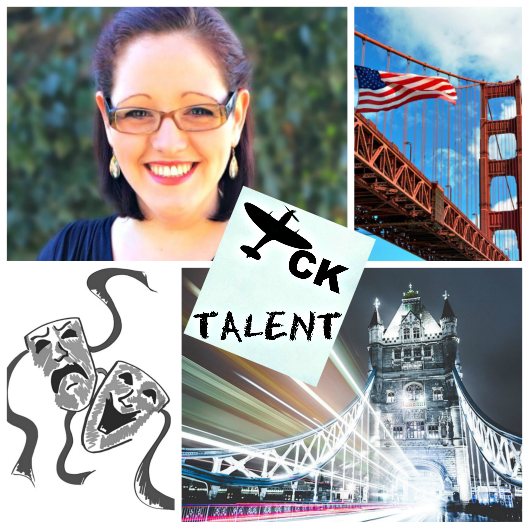
Columnist Elizabeth (Lisa) Liang has a “first” and a “last” to announce in this post. She will tell us all about what happened when she took her show, Alien Citizen, to Asia for the first time. But she will also tell us that this is her last regular column for the Displaced Nation. Having known her for three years (we even met in person once, when her show was in New York), I will miss interacting with her as well as reading her columns. But as is characteristic of her, she has kindly recruited a replacement. The show will go on! —ML Awanohara
Greetings, dear readers.
As ML just said, this will be my last article for TCK Talent. I’ll be moving on to devote more time to my solo shows, workshops, and acting career.
Starting in September, the column will be carried on by Dounia Bertuccelli, last month’s multi-talented interviewee. I know the column will thrive under her charge.
As ML also said, for my last post I’ll be presenting an account of the journey I made to Singapore in April to perform Alien Citizen: an earth odyssey—my one-woman show about growing up as a Third Culture Kid of mixed heritage.
It was my first time taking the show to Asia. I performed it for Third Culture Kid (TCK) high school students and their parents (many of whom had also been TCKs), teachers, and administrators, at two international schools.
* * *
Two miracles occurred on the flights to Singapore: I was in no pain despite a lower-back injury, and Dan (my husband and techie extraordinaire) and I both fell asleep! We normally can’t sleep on planes no matter what.
Unfortunately, we also experienced something troubling: my ankles and calves swelled up alarmingly. We guessed that this might be due to my choosing the Chinese options at mealtimes, which were tasty…but perhaps a foolish decision on my part since I’m mildly allergic to MSG.
(For details on the health scare that ensued, read my blog.)
Landing in a tropical city full of gardens and great food
Swollen body parts notwithstanding, we oooohed and aaaahed when we arrived at fancy Changi Airport, but were too tired to linger. As the cab drove us through the city-state to our AirBnB apartment, we were impressed by the many tall buildings and the lushly green urban landscape.
After that evening’s health melodrama, we slept like the dead. We had a few days to orient ourselves, sightsee, and start recovering from jet lag. I was expecting the heat of Panama alongside the humidity, but Singapore felt more humid than hot. (We perspired buckets nonetheless.)
Our adventures during the first two full days included:
- visiting the lovely, peaceful Chinese Garden…in the pouring rain…with one umbrella. (Dan had accidentally left his in the Uber car.) Despite the deluge, we were impressed by the Confucius statues and the Bonsai Garden.
- taking the immaculate and orderly MRT (metro). We loved hearing the train’s prerecorded announcements in Standard RP English, Mandarin, Malay, and Tamil.
- exploring the interior of the enormous ION Orchard, a mall on Orchard Road. (It was still raining outside.)
- ordering Malay and Indian food at a hawker stall in a mall near our AirBnB. (Singapore malls have food courts that serve the same scrumptious food you’d get at one of the famous hawker centres.)
- trying a local dessert of shaved ice topped with red beans, black jello, and syrup—sort of a combo of Ice Kachang and Grass Jelly. Super-sweet!
- experiencing Singapore’s favorite breakfast/snack at Toast Junction: kaya toast (sugar-coconut-buttered toast) served with two soft-boiled eggs, dribbled with a little bit of soy sauce, and a cup of hot coffee with condensed milk. Even if you’re not a fan of soft-boiled eggs (neither am I) or milk in your coffee (neither is Dan), we’re here to tell you that the whole combination is fantastic.

SHOWTIME #1 @ Canadian International School
On the first performance day we were up at 5:30 a.m. (The horror.) Our cab took us to Canadian International School in the pre-dawn darkness. In the impressively large and beautiful theatre, the school’s cheerful stage techie helped us to set up. I was warmly welcomed by a few faculty and admin members—and then the 9th through 11th graders started pouring in.
Showtime!
At first the audience was very quiet yet attentive. Some whispering began after 20 minutes and slowly grew louder until there was a low murmur toward the end.
Nonetheless, the students giggled and laughed at various appropriate places, and at the curtain call I heard a few hoots of appreciation along with the applause.
This was a relief because I rarely know how the show has been received until I take my bow. Afterward, drama teacher Julie and a slew of ATCKs (who are now moms to TCKs!) thanked me repeatedly for bringing the show to the school. I was especially validated by Julie’s appreciation of the script and performance since she’s a fellow theatre-maker.
As has happened after all of my performances, audience members approached to tell me about their own intercultural, nomadic lives and which parts of the show resonated the most for them.
One of them was a friend of a fellow Writing Out of Limbo author—thus proving how small the world is!
I loved hearing American accents from the non-US citizens and non-American accents from the US citizens. It made me feel like I was among my people, with that particular vibe of an international-school crowd, again.
My dear college friend Kikuko flew in from Tokyo just to see the show and flew back directly after, which blew my mind!
I learned later that the head of the school and the secondary school principal both enjoyed the show as well—always affirming to receive praise from the “top admin.” I will forever be grateful to Canadian International School for giving Alien Citizen its Asia Pacific debut.
As usual, my adrenaline was still pumping after the show, so Dan and I headed off to the Singapore National Museum. It had beautiful artifacts and displays, dense with information…and then we went home and crashed.

More marvels in this dot-sized city-state
On our day in between performances, we explored Little India. We saw our first Buddhist and Hindu temples, all of which were gorgeously colorful: Leong San See (Chinese Buddhist), Sakya Muni Buddha Gaya (Thai Buddhist with a huge Buddha statue), and Sri Srinivasa Perumal (Hindu). Each was a marvel for uninitiated us. We also saw the Sultan Mosque, which was more modest than the mosques I’ve toured elsewhere, but very welcoming to visitors.
It was another warm day and the humidity began to take its toll. Still, I enjoyed seeing the brightly painted two-story houses all walled together (like the one-story ones you see in Guatemala and other Latin American countries), with open shutters on the upper floors like in Cape Town.
When the humidity became overpowering, it was a pleasure to duck into a 7-Eleven (!) that blasted air conditioning—a/c is paramount in Singapore. We had lunch at Muthu’s Curry, where the delicious food was served on banana leaves. After waddling out we took an Uber to Arab Street and walked by tons of shops on the pedestrian road. At Sifr Aromatics I bought some blended-in-person Shadowfax perfume, which I adore.

SHOWTIME #2 @ Singapore American School
The next day we went to Singapore American School for my afternoon performance. The high school drama teacher, Tom, gave us a warm welcome. I would perform in one of three theatres on campus, which had a luxurious backstage area—aisles upon aisles of dressing-room vanity mirrors and a full bathroom! The school’s theatre techies were very professional and helpful.
During the performance, the audience was alert and even laughed heartily at a few points. Afterward, some audience members came up to praise the show and a faculty member gave me an emotional bear hug. (Every time an audience member shows that much appreciation, it’s a relief, because it highlights the show’s value for different people in different places even as time wears on. I never know if there’s going to be an expiration date.)
Again, it was especially validating to hear a fellow theatre-maker like Tom speak of the craft that goes into creating and performing a show like Alien Citizen. I’ve performed it so many times in non-theatrical venues that I’ve become resigned to folks who refer to the show as a “sketch.”
For those unfamiliar with my work: I perform over 30 characters (including myself at different ages), speak five languages in it, and take the audience through six countries while I’m all alone onstage…with no intermission…for 80 minutes. It’s my job to make it flow and feel intimate, but it has never been an easy one.
An old friend of my mom from my high school years in Egypt (it seems that everyone knows someone in Singapore) took Dan and me out for drinks and dinner afterwards to celebrate. We went to the American Club, which is humongous with several restaurants, a pool, library, convenience store, dry cleaner, and more—I’ve never seen anything like it. They make an excellent martini…

Final hurrah: Singapore
The next day: freedom! Now we could do whatever we wanted for the rest of the trip! We took the MRT to the old colonial district, where we visited the Merlion, Cavanagh Bridge, and the Asian Civilisations Museum. The latter had a fascinating shipwreck exhibit as well as a collection of gorgeous ceramics.
The next stop was Raffles Hotel for high tea. We each indulged in two servings of tiered tea trays of finger sandwiches, cakes, and tarts. The meal also included a buffet of dim sum (!), croque monsieurs, chicken pot pies, and scones. (By now you’ve figured out: I’m all about the food.) After stuffing ourselves to the sound of a musician playing musical theatre tunes on a harp, we peaked into the famous Long Bar. We decided against ordering an overpriced Singapore Sling and took an Uber home.
The following day we visited Chinatown. We loved the Chinese Heritage Centre, which recreates what a shophouse was like in the 1950s—very immersive and expertly done. There were tons of places to shop for knickknacks. We had lunch at Fill-a-Pita, my high-school-mate Hassan’s eatery, where he served us delicious vegetarian Egyptian/Middle Eastern food. Singapore is a true hub for international folk.
We then walked through the Singapore Botanic Gardens, which were lush and peaceful. (They are the only tropical gardens to be honored as a UNESCO Heritage site.) That evening we went to the famous Wee Nam Kee for a dinner of Hainanese chicken rice, Singapore’s wildly popular and yummy comfort food.
The next day we visited Liang Seah Street, which was recommended for its young vibe. I enjoyed seeing my surname on street signs! We returned to Chinatown to visit Singapore’s oldest Hokkien temple, Thian Hock Keng, the interior of which reminded me vaguely of my extended family’s “big house” in Guatemala City (tiled floor around an open sky patio). We then walked to the Buddha Tooth Relic Temple with its splendid interior. We were privileged to witness our first Buddhist service there.
That evening we went to the Night Safari, said to be the world’s first nocturnal zoo. Tip: get your tickets online to avoid a two-hour wait. It was fun to see nocturnal animals (and non-nocturnal animals, asleep) from all over the world as we were driven through on long trams. The elephants may have been the most thrilling sight. I had seen them and other animals on wildlife preserves in Kenya when I was 15, but that was a very long time ago. Alien Citizen’s final scene is set in Kenya, so there was a nice symmetry to seeing African animals on this trip.
On our last day we returned to Orchard Road. This time the sun was shining and we could see why it’s sometimes compared to the Champs d’Elysees or 5th Avenue. From there we went to the Peranakan Museum, which is basically the mixed heritage/multiracial/multicultural museum of Singapore. I felt very at home!
For our last adventure in the city, we took a Singapore River tour on a bumboat, the kind with a cheesy prerecorded commentary. I’m so glad we did, because we saw a completely different Singapore from the one we had been experiencing on the MRT and in cabs. It really is lovely along the banks of the quays and bays at twilight.
We capped the evening off by going to the Flight Bar at the Marina Bay Sands, a Vegas-style, three-towered behemoth of a hotel. Despite our sweaty, bedraggled appearance, we were given excellent service: they seated us at a perfect table overlooking both the bay and the city skyline. We toasted with my French “57” (its version of the drink that was originally served at the American Bar in Paris, later Harry’s New York Bar) and Dan’s Dark ‘N’ Stormy—overpriced but nonetheless a delightful VERY FINAL hurrah. After that celebratory toast, we managed to find one open restaurant, CoCo ICHIBANYA curry house, and gave that Japanese curry hell.
On our day of departure, after checking in at Changi Airport, we headed down to its ginormous food court and got our last kaya toast “Set A” at Ya Kun Kaya Toast. It was glorious. As we walked to our gate, we saw more of the deluxe airport, took pictures, and then had uneventful flights home. It took over two weeks to recover from the jet lag. It was worth it.

Final hurrah: TCK TALENT
It seems fitting for my last entry to be about Alien Citizen. I was first introduced to The Displaced Nation via an interview by amazing founder and editor ML Awanohara, when Alien Citizen was having its world premiere in Hollywood in 2013. ML asked me to write this column not long after the show’s first run ended, and it has been an honor to interview numerous fellow creative ATCKs for TCK Talent. They have all inspired, touched, and educated me. In the meantime, Alien Citizen has traveled around the USA on the college circuit, to festivals and conferences, and to private retreats and galas. It has also traveled the world to theatres, conferences, and international schools in Central America, Iceland, Europe, Africa, and now Asia. Furthermore, it was the catalyst for the workshops I now lead. We’ve come a very long way and we’re not even close to finishing the journey.
I feel privileged to have written for The Displaced Nation and am ever grateful to ML Awanohara for giving me the opportunity. Thank you, dear readers, for following along.
* * *
Thank YOU, Lisa, and the fondest of farewells! I will miss you. You really “got” what the Displaced Nation is about and over the years have showcased so many internationals who are now leading creative lives. You’ve also served as a shining example of that yourself, by reporting on the progress of your show—and several of those reports, like this one, have also been fascinating travelogues. I’m just so glad that the column you have created and shaped, highlighting the many talents of Adult Third Culture kids, will carry on in your wake. (Thank you, Dounia!) Meantime, please promise us you’ll come back to our fair shores from time to time for a visit—and perhaps even the occasional update post. Readers, please leave questions, comments, words of farewell 😥 😥 😥 to Lisa below.
Elizabeth (Lisa) Liang is a prime example of what she writes about in this column: an Adult Third Culture Kid working in a creative field. A Guatemalan-American of Chinese-Spanish-Irish-French-German-English descent, she is an actor, writer, and producer who created the solo show Alien Citizen: an earth odyssey, which has been touring internationally. To keep up with Lisa’s progress, be sure to visit her blog, Suitcasefactory. You can also follow her on Twitter and on Facebook.
STAY TUNED for next week’s fab posts!
If you enjoyed this post, we invite you to register for The Displaced Dispatch, a round up of weekly posts from The Displaced Nation, and so much more! Register for The Displaced Dispatch by clicking here!
Related posts:
Photo credits: Top visual: Singapore cityscape and garden images via Pixabay; Elizabeth Liang performing at the Canadian International School in Singapore, by Jacquie Weber (supplied); Alien Citizen (poster, supplied); and TCK Talent branding. Second visual: (clockwise from top left) Kaya Toast “Set A” breakfast at Toast Junction, by Daniel Lawrence (supplied); MRT image via Pixabay; Lisa at the ION Mall, selfie (supplied); and Chinese and Japanese gardens, Bonsai section, Singapore, by R Barraez D’Lucca via Flickr (CC BY 2.0). Third visual: Lisa performing at the Canadian International School in Singapore, by Jacquie Weber (supplied). Fourth visual: (clockwise from top left) Sri Srinivasa Perumal Temple via Pixabay; Daniel Lawrence in front of Sakya Muni Buddha Gaya Temple, by Lisa Liang (supplied); Muthu’s fish head curry, by Krista, and Arab Street and Sunday lunch, by Bryn Pinzgauer—both via Flickr (CC BY 2.0). Fifth visual: Singapore American School dressing room, selfie (supplied); and Singapore American School long shot, by Daniel Lawrence (supplied). Sixth visual: (top row) Lisa at Flight Bar, Marina Bay Sands Hotel, by Daniel Lawrence (supplied); and Elephant at Night – Night Safari Zoo – Singapore, by Glen Bowman via Flickr (CC BY-SA 2.0); (middle row) Lisa at the Merlion, by Daniel Lawrence (supplied); one of many buddhas in Buddha Tooth Relic Temple, by Lisa Liang (supplied); (bottom row) Changi Airport departure, by Lisa Liang (supplied); High Tea, Raffles Hotel, by llbrarianidol via Flickr (CC BY 2.0).










































